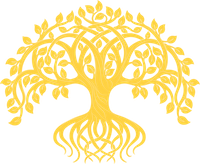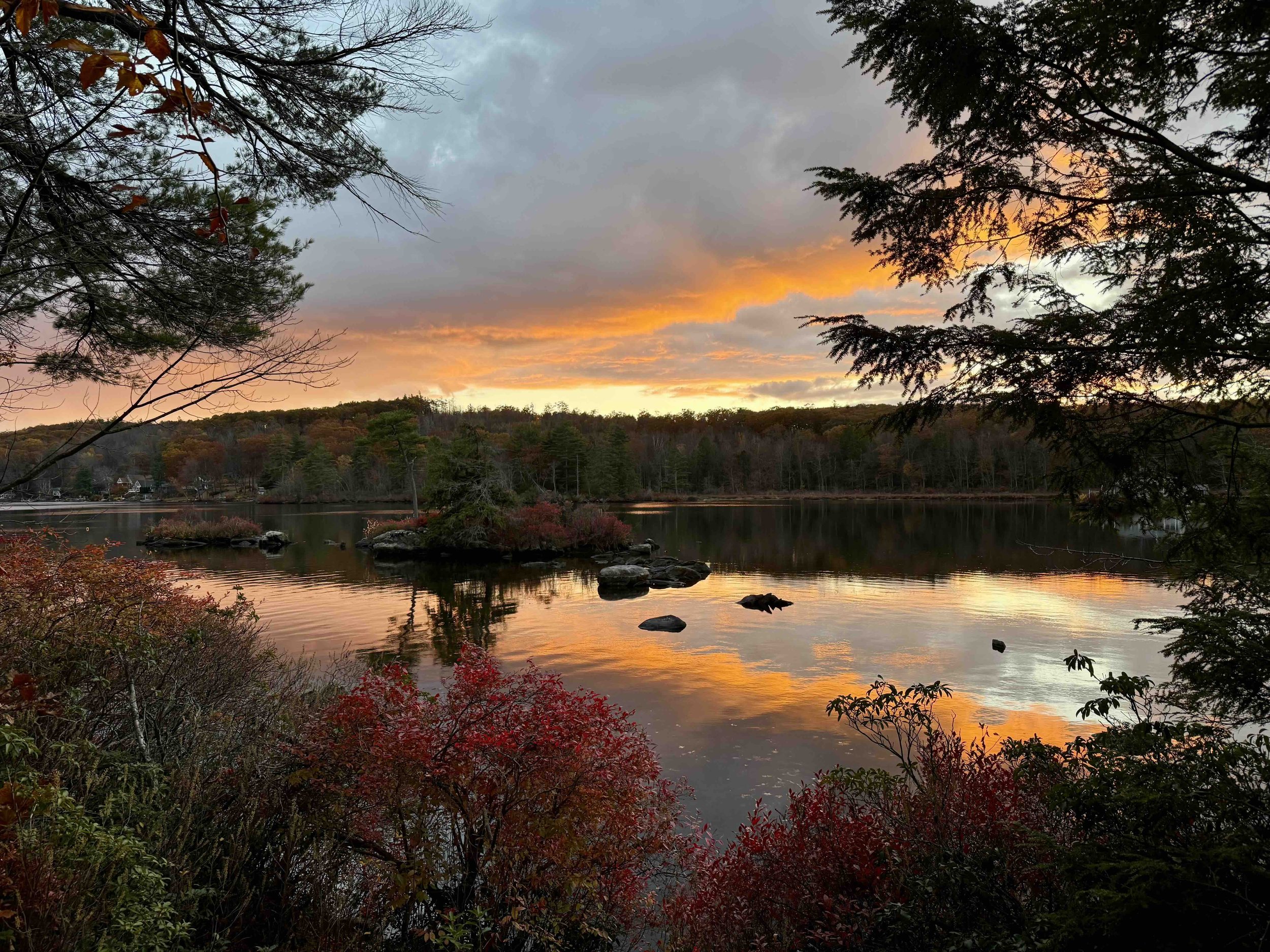I keep noticing how rushed many people feel. And, how even when nothing urgent is happening, the body can feel keyed up. Breath is shallow. Attention is scattered. There’s more anxiety, more worry, more fatigue, more discontentment, and a sense of disconnection from ourselves and from one another. These are all signals. They’re indications that there is a need for a slowing down in a fast world from a nervous system that rarely gets to rest.
December 2025 Newsletter: The Gift of Ten Percent Slower
A teaching I return to often is the practice of moving through life 10 percent slower. This isn’t about doing less. Rather, it’s about bringing a more unhurried quality to what you’re already doing. A small shift in pace can create more space in the nervous system, more awareness of thoughts and emotions, and a steadier sense of presence.
November 2025 Newsletter: The Gift of Awareness—Coming Home to Yourself for the Holidays
When we tune into the senses, even briefly, we interrupt the pull of rumination and re-enter what is actually here. We step out of the past or an imagined future and return—again and again—to this breath, this body, this moment. This returning—this remembering—to awareness is the practice AND the gift.
October 2025 Newsletter: Pop the Bubbles of Your Thoughts
Mindfulness is not about silencing thoughts or creating a perfectly calm mind. Rather, it helps us slow down so that we might see with more clarity and relate to what is arising in the present moment with kindness. With mindfulness, we learn to approach rather than avoid. We meet difficult thoughts or emotions with curiosity, seeing them as events rather than fixed truths. And, even painful patterns can become teachers when met with awareness and care.
September 2025 Newsletter: Gather What’s Ripe & Prepare To Release What’s Ready To Fall
The transition into autumn invites us to release what’s ready to fall to create room for rest and renewal in the months ahead. Trees show us that letting go creates space, as they’re also preparing for rest and renewal. When leaves drop, more light comes through. We see the sky again. We see the structure of the branches. We’re reminded that impermanence is about the beautiful cycle of transitions—one season folding itself into the next—and the gloriousness of the change itself.
August 2025 Newsletter: Intentional Living and Cultivating an "I GET TO" Attitude
The invitation this month is to continue practicing the three pillars of mindfulness—gently noticing when you’ve veered from your intention, your attention is scattered, and/or you’re bringing judgment or irritability into an experience rather than curiosity, compassion and care. When that occurs, return again and again to the right here, right now—feeling your feet on the floor, your breath in your body, and an appreciation that you get to be in this present moment.
July 2025 Newsletter: Mid-Summer Invitation to Reconnect with Intention, Attention and Attitude
In this post, what inspires me is how when we’re met with care, kindness and consistency, we can continue to flourish. When we nurture our intentions, pay attention to what is occurring right now, and adopt an attitude of flexibility, curiosity and care, we can flow with the changes, pivot when needed, and still find time to take in the sun, feel the wind in our hair, and make time for those glorious cat naps… in the midst of it all.
June 2025 Newsletter: Three Pathways to Presence this Summer
In this post, we return to the heart of the practice—present moment mindfulness. Over the next couple of months, I’ll be sharing reflections on three essential elements of mindfulness and pathways to presence, as taught by world renown meditation teacher, Jon Kabat-Zinn—intention, attention and attitude. Drawing from these three interwoven threads, we’ll explore ways to feel focused, compassionate and attuned—in the midst of all that this summer may bring.
May 2025 Newsletter: The Eightfold Path—Wise Mindfulness and Wise Concentration
As we turn toward the final two elements in the Noble Eightfold Path—Wise Mindfulness and Wise Concentration—we arrive at the heart of contemplative practice. These qualities support a deep and steady awareness, allowing us to stay present, respond with clarity, and meet each moment with compassion.
Online MBCT Course: Develop a New Relationship with Mind, Heart & Body
The 8-week online MBCT course invites us to wake up to our lives—moment-by-moment—and to see how much of our experience we miss when we’re caught up in doing, reacting or mentally rehearsing. Through mindfulness practices, we begin to experience what it's like to fully inhabit the moment, as if for the first time. This gradual shift lays the foundation for cultivating presence, curiosity and choice in how we meet our thoughts, emotions, and the world around us.
April 2025 Newsletter: The Eightfold Path—Wise Action, Wise Livelihood & Wise Effort
As we travel the Path with eight elements as allies, we are on our way to living with more grace, ease and goodness. We’ve already traveled through the first three aspects of the Path—wise view, wise intention and wise speech. This month, we delve into wise action and wise livelihood to complete the ethics portion of the Path, and then into wise effort, which is the first of the three strands of the Path related to mindfulness.
March 2025 Newsletter: The Eightfold Path—Wise Speech
Our words hold enormous power, and we are asked to be mindful of both our inner and outer narratives. As passed down through a lineage of teachers, it’s often said, “If you cannot control your mouth, there’s no way you can hope to control your mind.” This is why wise speech is so important in day-to-day practice.
February 2025 Newsletter: The Eightfold Path—Wise View and Wise Intention
I appreciate the wisdom in the Buddha beginning with wise view, and like to think of it as beginning a journey, having just arrived at a place we want to travel. Let’s say it’s a lovely hillside with a gorgeous view of a valley and a lake beyond. We have the Eightfold Path as our GPS coordinates, only what we really need with us, and we are ready. In this context, being ready means that we understand and accept the truths that we’ll encounter along the way—the dharma of how things truly are.
January 2025 Newsletter: The Four Noble Truths and Life's Bumpy Road
The theme of this month is the Four Noble Truths, which is seen as the core of Buddhism. These “truths of the noble one” comprise the essence of the Buddha’s teaching, and the simplicity of these four statements belies their depth. While this teaser into the essence of Buddhism leaves much unexplained, the fourth noble truths points us to the Eightfold Path, which we’ll move into over the next few months.connected to whatever it is that NOW is calling on us to notice and be with.
December 2024 Newsletter: Intention, Attention, Reflection and Love
The primary intent of Buddhist psychology is to live within a framework that seeks to reduce suffering for all beings, living with awareness and an intent to choose actions meant to be of benefit for ourselves and others. This is why the Buddha pointed us toward intentional awareness, which requires our attention, and is at the very center of mindfulness.
In its most simple definition, mindfulness means to pay attention on purpose with a kind and interested awareness. We cultivate intentional attention—mindfulness—so that we may nurture a feeling of friendliness, kindness and curiosity AND strengthen our staying power to remain connected to whatever it is that NOW is calling on us to notice and be with.
November 2024 Newsletter: The Hindrance of Skeptical Doubt
To get into the fifth hindrance of skeptical doubt, I’ll begin with the infamous story of the Buddha, whose birth name was Siddhartha Gautama. Siddhartha was born into an extremely wealthy family, which he left to become an ascetic monk, seeking answers to why there is suffering and how to remove it. The story goes that after having lived a history of having too much of everything in wealth and then living a renunciation of all material things, including barely eating anything, he finally felt ready to sit in meditation to encourage—to become—enlightened, awake, and fully present…
October 2024 Newsletter: The Hindrances of Sloth & Torpor/Restlessness & Worry
In sloth and torpor, we’re moving too slowly to put energy into anything and not awake enough to engage in the present moment; and in restlessness and worry, we are without peace and our energy too excitable and turbulent to allow us to relax into and clearly see what is actually occurring. In more current psychological terminology, sloth and torpor represent many aspects of depression and restlessness and worry are similar to anxiety. In this post, Dr. Karen Walant delves into these hindrances and offers ways to skillfully work with each.
September 2024 Newsletter: The Five Hindrances - Skillfully Working with the Hindrance of Ill Will - Part 3 of 6
As a hindrance, ill will arises when we don’t like something, or a quality/behavior of someone else or ourselves, and we want it gone. In the throes of this hindrance, we might experience pain, discomfort, disgust and even rage. We fixate on the focus of our ill will, trying to push what we dislike away; however, in ill will, we are like water that is heated to a boil, bubbling over. Filled with heat, the pushing away only creates more boiling bubbles and steam, and we are unable to see with clarity.
August 2024 Newsletter: The Five Hindrances - Skillfully Working with the Hindrance of Sensual Desire - Part 2 of 6
Sensual desire, or kāmacchanda, is the first of the five mental obstacles that prevent awakening, freedom and our ability to see clearly that which is actually occuring in the present moment. Psychotherapist and meditation teacher Dr. Karen Walant helps us understand and skillfully work with this hindrance that focuses on fantasy and often manifests as the constant pursuit of pleasure, fuels addictions, and keeps us stuck in habits and “chanda, which literally translates into “wanting.”





















